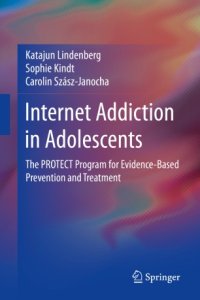
Ebook: Internet Addiction in Adolescents: The PROTECT Program for Evidence-Based Prevention and Treatment
- Tags: Psychology, Child and School Psychology, Educational Policy and Politics, Social Work
- Year: 2020
- Publisher: Springer International Publishing
- Edition: 1st ed.
- Language: English
- pdf
This book presents a new, evidence-based cognitive behavioral intervention for the prevention and treatment of Internet addiction in adolescents. It provides a comprehensive overview of the current state of research regarding phenomenology, diagnostics, epidemiology, etiology, and treatment and prevention of Internet addiction as a new behavioral addiction. The book is divided into two sections. The first part of the book explores various bio-psycho-social factors that contribute to the development and maintenance of symptoms in young individuals. Chapters in the second part of the book discuss the PROTECT intervention to reduce Internet addiction in adolescents. PROTECT aims to modify risk factors and maintenance factors, specifically, boredom and motivational problems, procrastination and performance anxiety, social anxiety and maladaptive emotion regulation. The PROTECT intervention is a low-intensity approach which uses comprehensive case examples in order to increase cognitive dissonance and treatment motivation. In addition, PROTECT contains cognitive behavioral intervention techniques such as psychoeducation, behavior activation, cognitive restructuring, problem solving and emotion regulation.
Topics featured in this book include:
- Adolescence and development-specific features of Internet addiction.
- An overview of modifiable risk factors and maintenance factors of Internet addiction.
- Environmental factors that affect the development of Internet addiction.
- Online and offline video gaming addiction.
- Social network addiction.
- Strategies that work in prevention and treatment.
Internet Addiction in Adolescents is a must-have resource for researchers, professors, clinicians and related professionals as well as graduate students in clinical child, school, and developmental psychology, educational policy and politics, and social work as well as related disciplines.